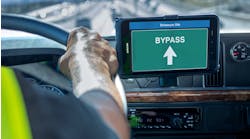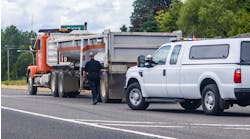Editor’s note: This is the first part of a series leading up to International Roadcheck 2019. Read Part 2, Part 3 and Part 4 of the series
Roadside inspections are a fact of life. Violations can cost fleets in terms of downtime and a lower Compliance, Safety, Accountability (CSA) score. However, law enforcement and industry officials said there are steps fleets and drivers can take to ensure a smooth inspection.
“We like for fleets to always be ready for an inspection. No fleet wants their truck or driver to cause a fatality,” said Michael Forman, southern region commander for the enforcement division of the Mississippi Department of Transportation. He recommended fleets be extra vigilant ahead of the Commercial Vehicle Safety Association’s Roadcheck 2019 enforcement blitz, scheduled to take place from June 4-6.
While safety is always a priority, J.B. Hunt Transport Services does take additional steps with its drivers and managers for Roadcheck, said Lee Sarratt, J.B. Hunt’s director of safety.
“Maybe even more importantly, we work with our maintenance group to make sure we’re doing all of those things from a maintenance standpoint that we should be checking for, such as leaks and air hoses,” he explained.
By utilizing bypass technology from Drivewyze, J.B. Hunt drivers can often avoid stopping at weigh stations. That saves time, but means the fleet doesn’t have as many inspections contributing to its CSA score. “All in all, we’ll take the bypasses over what we’re missing in the inspections,” Sarratt said.
Scott Dewey, manager of safety process and compliance at FedEx Freight, said it is important to educate drivers on CVSA’s most comprehensive Level 1 inspections, how to properly interact with inspectors, and the documents they will need to present.
“Drivers should have available their commercial driver’s license, health card, shipping documents, and hazmat paperwork,” Dewey explained.
Drivers should also have their registration, insurance, any applicable lease agreement, and receipts used as supporting documents for an electronic logging device readily available, said Kerri Wirachowsky, CVSA’s director of roadside inspection program.
Drivers should be prepared to retrieve their current day’s electronic log as well as the logs for the previous seven days. They also need to have either a printed ELD user manual or an electronic user guide available.
Wirachowsky noted ELDs continue to cause confusion for some drivers. “If the driver is utilizing an electronic device for his hours of service, he needs to know how to use it, how to navigate it, and if he is using an ELD or an automatic onboard recording device,” she explained.
This is the first part in a series leading up to International Roadcheck 2019. Next week, we’ll look at how fleets can improve safety in advance of Roadcheck, along with the role technology plays, how roadside inspectors think and a deeper look at the inspection process. Read Part 2, Part 3 and Part 4 of the series



